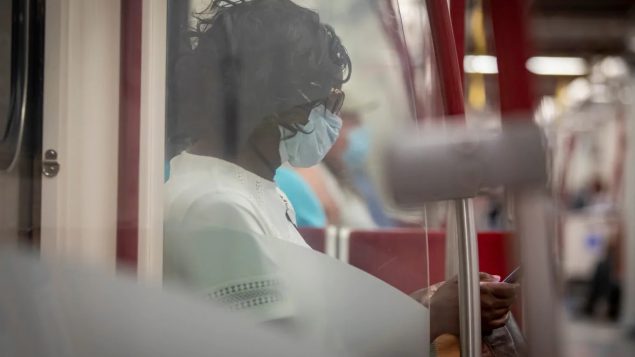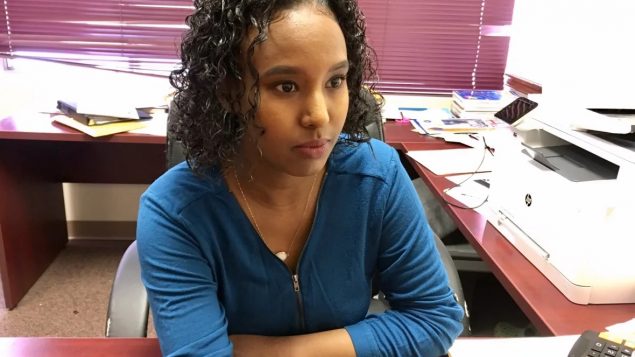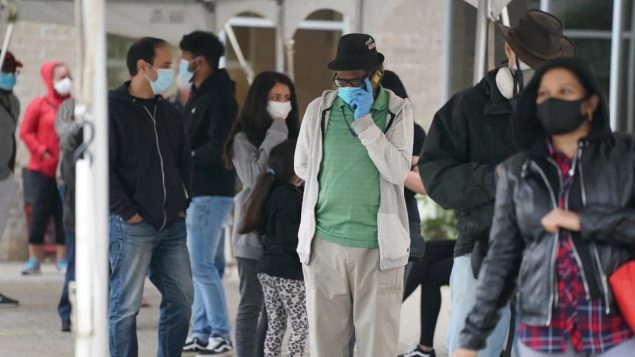A new study appears to confirm what many have been saying since the pandemic broke out in Canada in the spring: Black Canadians are being hit disproportionately hard by COVID-19 physically and financially.
The study, which its authors say is the first of its kind in Canada, was carried out by the Edmonton-based African Canadian Civic Engagement Council and Innovative Research Group.
It looked at the health and economic impacts of COVID-19 from the perspectives of Black Canadians and those in the broader Canadian population.
It found that Black Canadians are more likely than other Canadians to seek treatment and experience layoffs due to the virus and are also more likely to report feeling at risk on their commute to work, the research reveals.

The study found that among commuters, Black Canadians are twice as likely than the national average to feel their commute to work is unsafe, with Black commuters more likely to experience symptoms or seek medical treatment. (Evan Mitsui/CBC)
The research comes after warnings from advocates, researchers and social agencies across Canada that a lack of race-based data is a barrier to ensuring those most affected by the pandemic get the help they need.
Last month, advocates launched a website in Quebec to try to get a more accurate reading on how people of colour are being affected by COVID-19.
The study’s findings show Black Canadians are more likely than other Canadians to be infected or hospitalized by the disease and nearly three times more likely to know someone who has died after contracting COVID-19.
Black Canadians are also more likely (56% to 43%) to report layoffs or reduced working hours in their household and are more worried, over the next few months, about paying rent (45% to 36%). They are also more likely than the Canadian average to say their household finances have been negatively impacted by COVID-19.
Among other findings:
- Although further research is needed, poorer health outcomes for Black Canadians may be explained by greater exposure at work to the virus.
- Black Canadians are much more likely to report their job requires them to work with people face-to-face (net +41 vs. +25 national average).
- They are also more likely to feel that no matter what steps they take, their day-to-day routine puts them at an uncomfortably high risk of catching the virus.
- Those who worked in front-line jobs, such as cashiers, personal support workers, nurses and drivers, and who relied on public transit to get to work reported they felt most at risk.
- A factor may be the commute, as Black Canadians are twice as likely to take public transport (25% vs. 12%) and twice as likely to report that their commute is unsafe (24% vs. 12%)
Dunia Nur, president of the African Canadian Civic Engagement Council, told the CBC’s Andrea Huncar the new research tells a largely untold story about the lived experiences of Black Canadians around COVID-19.
“Data will give communities the opportunity to apply for funding and say, ‘This is what it says in Alberta, this is what it says in Ontario, therefore we definitely need support here,'” Nur said.
“Anecdotally, we hear the story, but now the story is alive and is living through empirical research.”

Dunia Nur, president of the African Canadian Civic Engagement Council, co-authored the study that found COVID-19 is disproportionately impacting the health and finances of Black Canadians. (Andrea Huncar/CBC)
The new research found that Black communities are experiencing layoffs, reduced work hours and a reduction in household incomes at higher rates, with men over 45 being hardest hit.
Fifty-six per cent of Black respondents said their job, or the job of someone they knew, had been affected, compared with the national average of 46 per cent.
“It seems as though they’re just naturally in a higher-risk situation given their socioeconomic and demographic circumstances,” Jason Lockhart, Innovative Research Group’s vice-president and a principal researcher on the project, told Huncar.
The survey was conducted online among a representative sample of 2,322 Canadians, including a representative sample of 400 Black Canadians, from June 17 through June 30.
Nur and Lockhart said they hope the study–though small–will encourage governments to collect more data in areas such as how the virus impacts children in more marginalized communities.
In July, a study in Toronto found that Black people and other people of colour make up 83 per cent of reported COVID-19 cases while only making up half of the city’s population.
A University of Minnesota study last month found that Black people in the US were three times more likely than whites to get COVID-19
With files from CBC News (Andrea Huncar)







For reasons beyond our control, and for an undetermined period of time, our comment section is now closed. However, our social networks remain open to your contributions.